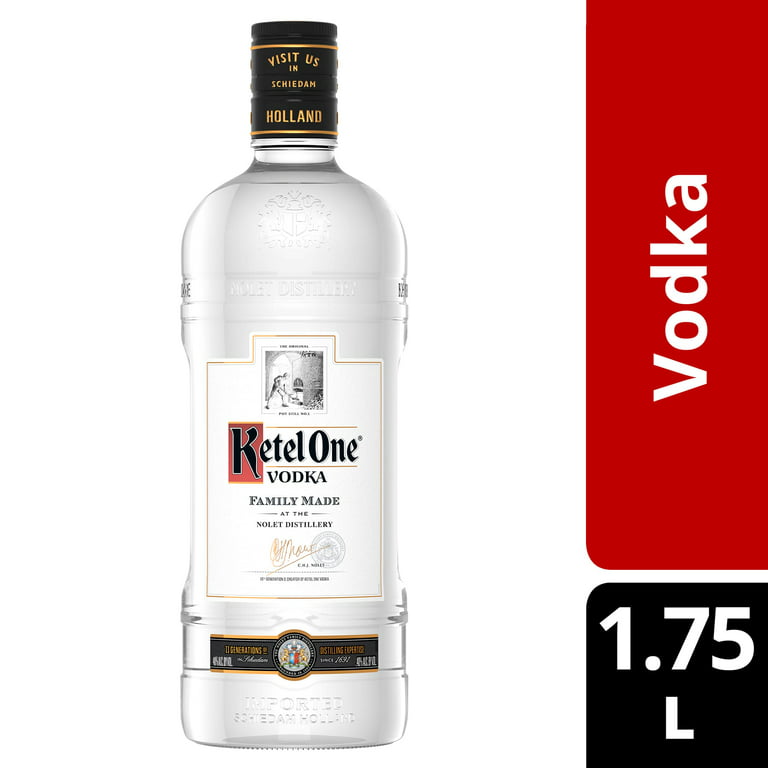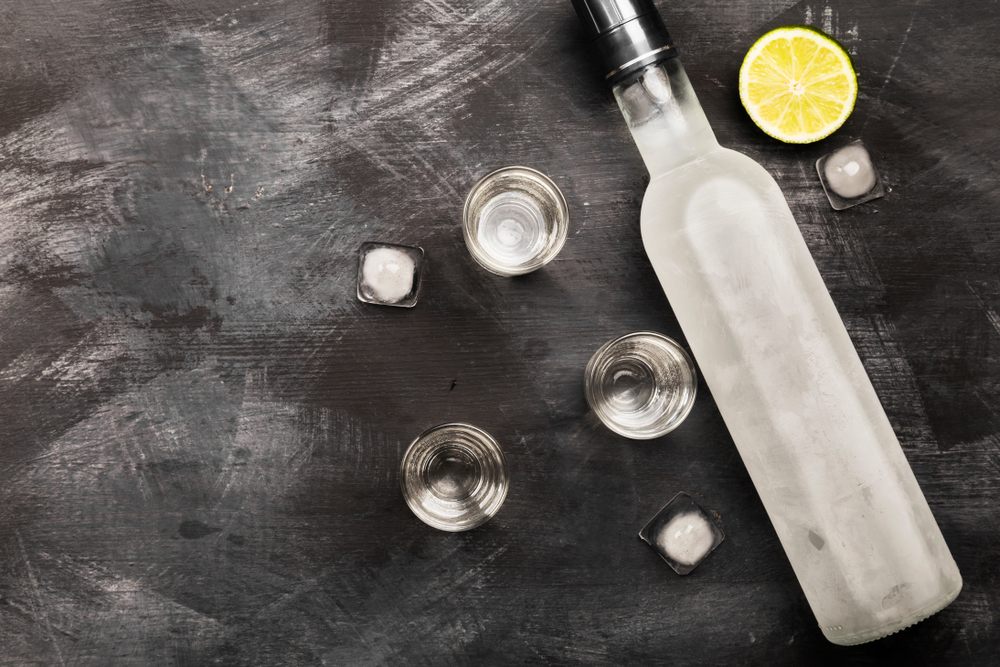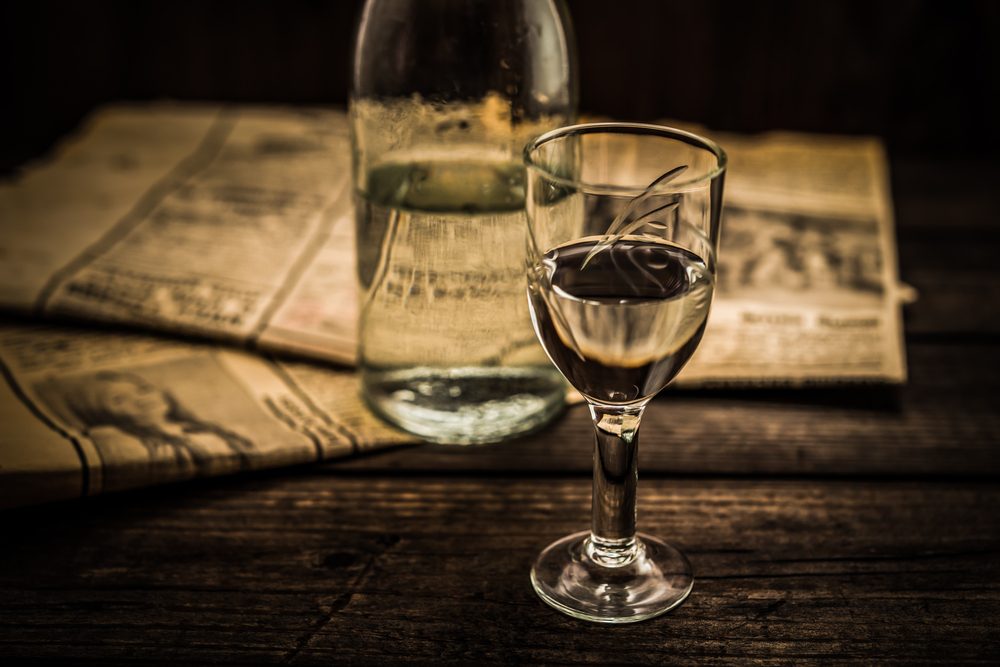
Introduction
The Shelf Life Of Vodka: Fact Or Myth?
Vodka is known for its long shelf life, both when unopened and opened. Many people wonder if vodka can go bad over time, but the answer is generally no. Whether it is stored properly or not, vodka has an impressively long shelf life. Freezing vodka is also an option, but it is more of a matter of personal preference rather than a necessity.
Factors That Affect The Shelf Life Of Vodka
There are a few factors that can affect the shelf life of vodka. While the shelf life is generally quite long, certain conditions or factors can impact its quality over time. These factors include:
- Storage conditions: Proper storage is crucial to maintain the quality and taste of vodka. It is recommended to store vodka in a cool and dark place, away from direct sunlight and heat. Exposure to high temperatures and sunlight can cause the vodka to deteriorate faster.
- Packaging: The packaging of vodka plays a role in its shelf life as well. Vodka is typically sold in glass bottles, which are impermeable to air and light. This helps to preserve the vodka’s quality and prevent it from spoiling. However, if the bottle is damaged or the seal is broken, it is best to consume the vodka sooner rather than later.
- Flavored vodka: Flavored vodkas may have a slightly shorter shelf life compared to plain vodka. This is because the added flavorings can potentially affect the stability of the vodka over time. Always check the bottle’s label or the manufacturer’s website for specific instructions on the shelf life of flavored vodkas.
In conclusion, vodka has a long shelf life and does not typically go bad over time. As long as it is stored properly and the packaging is intact, vodka can maintain its quality for an extended period. However, certain factors like storage conditions and the presence of flavorings can affect the vodka’s shelf life. It is always a good idea to consult the bottle’s label or the manufacturer’s website for specific instructions on how to store and consume vodka.
Understanding Vodka Shelf Life
How Long Does Unopened Vodka Last?
Unopened vodka has an impressively long shelf life. Due to its low water content and high alcohol concentration, vodka has a minimal risk of bacterial contamination or spoilage. Most vodkas contain few or no additives, which allows them to be stored almost indefinitely. When stored in a cool, dark place away from direct sunlight and heat, unopened vodka can maintain its quality and taste for an extended period.
Determining The Potency And Flavor Of Unopened Vodka
The potency and flavor of unopened vodka are largely preserved, especially when stored properly. However, it is essential to note that the quality of vodka may deteriorate slightly over time, even if it is unopened. Factors such as packaging, storage conditions, and the presence of flavorings can influence the vodka’s overall taste and aroma.
- Packaging: Vodka is typically sold in glass bottles, which provide a protective barrier against air and light. This helps maintain the vodka’s flavor and prevent spoilage. However, if the bottle is damaged or the seal is broken, it is recommended to consume the vodka sooner rather than later.
- Storage conditions: Proper storage is crucial to maintain the quality and potency of vodka. High temperatures and exposure to sunlight can accelerate the deterioration process. It is advisable to store vodka in a cool, dark place, away from heat sources and direct sunlight.
- Flavored vodka: Flavored vodkas may have a slightly shorter shelf life compared to plain vodka. The added flavorings and additives in flavored vodkas can potentially affect their stability over time. It is best to refer to the bottle’s label or the manufacturer’s guidelines for specific instructions on the shelf life of flavored vodkas.
In summary, unopened vodka has a long shelf life and does not typically go bad over time. Proper storage in a cool, dark place, intact packaging, and considering the presence of flavorings can help maintain the vodka’s quality and flavor for an extended period. It is always recommended to check the manufacturer’s guidelines or consult the bottle’s label for specific instructions on storing and consuming vodka.
Does Vodka Expire?
Dispelling The Myth Of Vodka Expiration
Vodka, whether unopened or opened, does not typically expire. In fact, unopened vodka can last for several decades and still taste just as good as when it was first distilled. This is due to vodka’s low water content and high alcohol concentration, which make it resistant to bacterial contamination and spoilage. While the flavor and quality of vodka may slightly deteriorate over time, it can still be safely consumed.
The Truth About Opened Vodka And Its Shelf Life
Opened vodka can also have a long shelf life if stored properly. After opening a bottle of vodka, it is recommended to consume it within a reasonable time frame to maintain its freshness. However, as long as the vodka is stored correctly, it can last for a significant period without any noticeable changes in taste or quality. It is crucial to store the opened bottle in a cool, dark place, away from direct sunlight and heat sources.
When it comes to freezing vodka, it is not necessary but purely a matter of personal preference. Some people prefer to store their vodka in the freezer to enjoy a chilled drink, while others do not. Freezing vodka does not affect its quality or potency, but it can slightly change the texture due to the alcohol’s low freezing point.
In conclusion, vodka does not expire in the same way as perishable foods or beverages. Whether unopened or opened, vodka can last for an impressively long time if stored correctly. Factors such as packaging, storage conditions, and the presence of flavorings can influence the vodka’s overall taste and aroma. It is always recommended to consult the bottle’s label or the manufacturer’s website for specific instructions on how to store and consume vodka.

Factors Affecting Vodka Shelf Life
The Role Of Oxidation In Vodka Degradation
Factual Data:
- Quality may deteriorate over time due to oxidation, particularly after opening.
When vodka is exposed to oxygen, it can lead to chemical reactions that may affect its flavor and aroma. This is why it is crucial to seal the bottle tightly after each use to minimize oxidation. Even though vodka has a high alcohol content, it is not completely immune to oxidative changes. Over time, the oxygen in the air can cause the breakdown of certain compounds in vodka, resulting in a slight deterioration of its quality and taste.
How Storage Conditions Can Impact The Shelf Life Of Vodka
Exposure to Light and Heat:
- Vodka should be kept away from direct sunlight and heat sources as these can alter its flavor and quality over time.
- UV light from the sun can accelerate the oxidation process, leading to a faster degradation of the vodka.
- Heat can also cause chemical reactions that may change the characteristics of the vodka, affecting its overall quality.
Temperature and Humidity:
- Vodka should be stored at a cool and consistent temperature, ideally around 15 to 20 degrees Celsius (59 to 68 degrees Fahrenheit).
- Fluctuations in temperature can accelerate the oxidation process and promote the growth of bacteria or other contaminants.
Bottle Integrity:
- The quality of the vodka’s packaging can also play a role in its shelf life.
- A well-sealed bottle with a tight-fitting cap or cork can help prevent oxidation and maintain the vodka’s quality for a longer period.
In conclusion, proper storage conditions are essential for maintaining the shelf life of vodka. It is important to seal the bottle tightly, store it in a cool and dark place, and protect it from exposure to light and heat sources. While vodka does not expire like perishable foods, it can still experience changes in flavor and quality over time. By following these storage guidelines, vodka can be enjoyed for an extended period without significant deterioration.
Maximizing The Shelf Life Of Vodka
Best Practices For Storing Unopened Vodka
Proper storage conditions can help maximize the shelf life of unopened vodka. Follow these guidelines:
- Keep the vodka bottle in a cool and dark place, away from direct sunlight and heat sources.
- Avoid fluctuations in temperature, as they can accelerate oxidation processes and promote bacterial growth.
- Ensure the bottle is tightly sealed to minimize exposure to oxygen.
- Store the bottle upright to prevent any leaks or spills.
By following these practices, unopened vodka can maintain its quality and flavor for an extended period.
Tips For Preserving The Quality Of Opened Vodka
Once a bottle of vodka is opened, there are additional steps you can take to preserve its quality:
- Minimize the amount of air that comes into contact with the vodka by resealing the bottle tightly after each use.
- Consider transferring the vodka to a smaller container to reduce the amount of airspace inside the bottle.
- Keep the opened vodka in a cool and dark place, away from direct sunlight and heat sources.
- Use the vodka within a reasonable timeframe to minimize the effects of oxidation.
Remember that while vodka does not expire like perishable foods, its quality may gradually deteriorate over time. By following these tips, you can enjoy the opened vodka for an extended period without significant changes in flavor or quality.
In conclusion, by storing unopened vodka in a cool and dark place, away from light and heat sources, and properly sealing opened vodka after each use, you can maximize its shelf life and maintain its quality. Always consult the manufacturer’s instructions for specific details as different flavorings and production methods can lead to variations in shelf life. Enjoy your vodka responsibly and savor its flavors for as long as possible!
Extending Shelf Life: Flavored Vodka
The Impact Of Additives On Flavored Vodka Longevity
Flavored vodka adds a unique twist to the traditional clear spirit, but it’s important to consider the shelf life of these products. While unopened bottles of flavored vodka can last indefinitely if stored properly, the flavors may start to degrade or change over an extended period, especially if there are natural flavorings or added sugars. This can affect the overall quality and taste of the vodka. Flavored vodka tends to have a shorter shelf life of around 3 months compared to regular vodka due to the sugars in the liquid causing it to oxidize. Therefore, it’s best to enjoy flavored vodka within 90 days of opening to ensure optimal flavor and quality.
How Long Does Flavored Vodka Last Compared To Unflavored?
Unflavored vodka, when stored properly, can have an almost-indefinite shelf life. However, the added flavors in flavored vodka can affect its longevity. Flavored vodka tends to have a shorter shelf life due to the presence of additives and sugars, which can lead to oxidation and changes in flavor over time. On the other hand, unflavored vodka can maintain its quality and flavor for much longer if stored correctly.
To maximize the shelf life of flavored and unflavored vodka, it’s important to follow some best practices. For unopened vodka, store the bottle in a cool and dark place, away from direct sunlight and heat sources. Ensure the bottle is tightly sealed to minimize exposure to oxygen and store it upright to prevent leaks or spills. Once opened, minimize air exposure by resealing the bottle tightly after each use and consider transferring the vodka to a smaller container to reduce airspace. Keep the opened vodka stored in a cool and dark place, away from light and heat. Using the vodka within a reasonable timeframe also helps to minimize the effects of oxidation.
Remember to always consult the manufacturer’s instructions for specific details as different flavorings and production methods can lead to variations in shelf life. By following these tips, you can extend the shelf life of your flavored vodka and maintain its quality for as long as possible. Enjoy responsibly and savor the delightful flavors of flavored vodka!

Signs Of Expired Vodka
Identifying Signs Of Spoilage In Vodka
Even though vodka has an almost indefinite shelf life when properly stored, it’s essential to be aware of the signs that indicate spoilage or degradation. Here are some indicators to watch out for:
- Changes in color: If you notice any discoloration in your vodka, such as a yellow or brown tint, it may indicate oxidation or the presence of impurities.
- Unpleasant odor: Vodka should have a neutral scent. If you detect any unusual or unpleasant odors, it could be a sign of spoilage or contamination.
- Altered taste: High-quality vodka should have a smooth and clean taste. If you notice any off-flavors or a significant change in the taste profile, it’s best to discard the vodka.
When To Discard Vodka For Safety Reasons
To ensure a safe drinking experience, it’s important to know when to discard vodka. Here are some instances where it’s advisable to dispose of your vodka:
- Visible mold or particles: If you spot any mold growth or foreign particles in the vodka, it’s a clear sign of contamination. In this case, it’s best to discard the entire bottle.
- Bitter or sour taste: A strong bitter or sour taste that wasn’t present before may indicate spoilage or bacterial growth. It’s safer to get rid of the vodka rather than risk consumption.
- Off-putting smell: If your vodka emits a strong, unpleasant odor, it could be a sign of bacterial contamination or other spoilage. It’s wise to err on the side of caution and dispose of the vodka.
- Prolonged exposure to air: Over time, vodka can slowly degrade due to oxidation. If you’ve had an opened bottle for an extended period, it’s advisable to discard the remaining vodka to ensure the best drinking experience.
Always prioritize safety and quality when it comes to consuming vodka. If you have any doubts or concerns about the condition of your vodka, it’s better to be safe and discard it. Regularly checking for signs of spoilage and following proper storage guidelines will help ensure a delightful drinking experience.
Creative Uses For Expired Vodka
Repurposing Expired Vodka In Cooking And Cleaning
Expired vodka may no longer be suitable for drinking, but that doesn’t mean it has to go to waste. Here are some creative ways to repurpose expired vodka:
- Cooking: Expired vodka can be used in cooking to enhance flavors and add a unique touch to dishes. It can be used in marinades, sauces, and even desserts like vodka-infused cakes or sorbets. Just remember that the alcohol content may have decreased, so adjust the recipe accordingly.
- Cleaning: The high alcohol content in vodka makes it an effective cleaning agent. Mix it with water and use it to clean windows, mirrors, and countertops. The alcohol helps remove grease and grime, leaving surfaces sparkling clean. You can also use it to freshen up upholstery or remove stains from carpets by blotting the area with a mixture of vodka and water.
Alternative Uses For Vodka Past Its Prime
Expired vodka can also come in handy for various other purposes around the house. Here are some alternative uses for vodka past its prime:
- Freshen up clothes: Add a few drops of vodka to a spray bottle filled with water and use it as a fabric freshener. Mist it onto clothes or linens to neutralize odors and give them a fresh scent.
- DIY air freshener: Mix vodka with essential oils and water to create your own homemade air freshener. Spray it around your home to eliminate unwanted odors and create a pleasant atmosphere.
- Jewelry cleaner: Soak your jewelry in a mixture of vodka and water for a few minutes, then gently scrub it with a soft brush. The alcohol helps remove dirt and restore shine to your precious pieces.
- Bug repellent: Fill a spray bottle with vodka and a few drops of essential oils like citronella or lavender. Use it as a natural bug repellent by spraying it on your body or in outdoor areas where bugs tend to gather.
With these creative uses, you can give your expired vodka a new lease on life and make the most out of every drop. Remember to always use caution and follow proper storage guidelines for any leftover vodka.
Creative Uses For Expired Vodka
Repurposing Expired Vodka In Cooking And Cleaning
Expired vodka may no longer be suitable for drinking, but that doesn’t mean it has to go to waste. There are various creative ways to repurpose expired vodka:
- Cooking: Expired vodka can be used in cooking to enhance flavors and add a unique touch to dishes. It can be used in marinades, sauces, and even desserts like vodka-infused cakes or sorbets. Adjust the recipe accordingly, as the alcohol content may have decreased.
- Cleaning: The high alcohol content in vodka makes it an effective cleaning agent. Mix it with water and use it to clean windows, mirrors, and countertops. The alcohol helps remove grease and grime, leaving surfaces sparkling clean. You can also use it to freshen up upholstery or remove stains from carpets by blotting the area with a mixture of vodka and water.
Alternative Uses For Vodka Past Its Prime
Expired vodka can also come in handy for various other purposes around the house. Here are some alternative uses for vodka past its prime:
- Freshen up clothes: Add a few drops of vodka to a spray bottle filled with water and use it as a fabric freshener. Mist it onto clothes or linens to neutralize odors and give them a fresh scent.
- DIY air freshener: Mix vodka with essential oils and water to create your own homemade air freshener. Spray it around your home to eliminate unwanted odors and create a pleasant atmosphere.
- Jewelry cleaner: Soak your jewelry in a mixture of vodka and water for a few minutes, then gently scrub it with a soft brush. The alcohol helps remove dirt and restore shine to your precious pieces.
- Bug repellent: Fill a spray bottle with vodka and a few drops of essential oils like citronella or lavender. Use it as a natural bug repellent by spraying it on your body or in outdoor areas where bugs tend to gather.
With these creative uses, expired vodka can be given a new lease on life. Remember to always use caution and follow proper storage guidelines for any leftover vodka.
FAQ: Can Vodka Go Bad? Exploring Shelf Life
Q: Can vodka go bad?
A: No, vodka does not go bad like other perishable goods. It has an exceptionally long shelf life and can remain safe for consumption indefinitely.
Q: How long does vodka last?
A: Vodka has an almost indefinite shelf life if stored properly. When kept unopened in a cool and dark place away from direct sunlight and extreme temperature fluctuations, it can retain its quality for many years.
Q: Does vodka expire?
A: Vodka does not have an expiration date. Unlike food products, it does not have organic components that deteriorate over time. As long as the vodka has been stored correctly, it can be consumed even after several years without any concerns.
Q: What happens if vodka is stored improperly?
A: Storing vodka improperly may cause the quality to degrade over time. Exposure to sunlight, heat, or air can affect its flavor, color, and overall taste. So, it’s important to store vodka in a cool, dark place for optimal preservation.
Q: Can vodka freeze?
A: Vodka has a relatively low freezing point, which is around -16 to -27 degrees Celsius or 0 to -3 degrees Fahrenheit. While it may become thick and syrupy at these temperatures, it doesn’t solidify completely. Once thawed, the vodka will return to its original consistency without any significant changes.
Q: How can you tell if vodka has gone bad?
A: Vodka that is past its prime may undergo changes in appearance, taste, and aroma. If the color has significantly darkened or there are visible floating particles, it’s best to discard it. Additionally, if it smells off or tastes unpleasantly different, it’s advisable not to consume it.
Q: Is it safe to drink expired vodka?
A: Consuming expired vodka that has gone bad is not recommended. Although it is unlikely to cause any serious harm, the altered taste and potential microbial activity may lead to a less enjoyable experience. It’s always better to err on the side of caution and dispose of any expired or spoiled vodka.
Q: Can a contaminated vodka make you sick?
A: Contamination in vodka is rare due to its high alcohol content, which acts as a natural preservative. However, if the vodka has been exposed to unsanitary conditions, mold, or harmful bacteria, it is possible to get sick from consuming it. Hence, it’s crucial to observe proper storage and handle vodka hygienically.
Q: What are some signs of contamination in vodka?
A: Signs of contamination may include off-flavors, a foul odor, a change in color, or the presence of visible particles. If you notice any of these signs, it is best to avoid drinking the vodka and dispose of it properly.
Q: Does flavored vodka have a shorter shelf life?
A: Flavored vodka generally has a similar shelf life to regular vodka if stored correctly. However, some natural flavorings may degrade over time, reducing the intensity of the taste. It’s advisable to consume flavored vodka within a reasonable period to ensure the best flavor experience.
In summary, vodka does not go bad in the traditional sense, and when stored properly, it can last indefinitely. Avoid exposure to sunlight, heat, and air for extended periods to maintain its quality. Remember to use your senses to determine whether it’s time to discard any vodka that may have deteriorated or become contaminated.

At Deep Woods Distillery, we try to put an essence of the Great Oregon Forest in each bottle of hand-crafted liquor we make. All of our spirits are made from scratch in Oakridge, Oregon, from select ingredients.